Kellyn Roth's Blog: Kellyn Roth, Author, page 8
May 3, 2023
5 Vital To Dos That Should Be on Every Author’s List

Hey folks! I thought it’d be fun to do a basic post with some things I often see authors NOT doing … that they should! Let’s get right into it.

Once you have a book out, make sure your Amazon Author Central, Goodreads, and BookBub accounts and keep them updated with the most recent information on you, from bios to links to author photos! And mostly, keep your books updated!
2: Use the Same Usernames Across All ChannelsIf you’re going with @kellynrothauthor, stick with @kellynrothauthor wherever you have social media! If you can get just your name, that’s ideal. Using something obscure and unrelated to your name is not ideal. I will not that some things won’t be available across all profiles (or at all), so you may have to vary things by using punctuation (kellyn.roth) or what I did on Twitter, @kellyntheauthor.
3: Claim Your Website URL Early On & Keep It SimpleIf you can get yourname.com (or penname.com), get it early on. Keeping it simple will help keep people up to date on how to find you! I own both kellynroth.com and kellynrothauthor.com (in addition to kellynroth.blog).
4: Use the Same Author Photo (& header & other branding) Across Social MediaTake one professional (or near-professional) author photo to use everywhere. Make sure your bios are the same or similar across all profiles, too, as well as headers, graphics used, etc. Basically, give it a consistent look so people can find you anywhere.
Set Up a Newsletter Welcome Sequence & Keep It UpdatedMake sure you have at least one email that triggers when people sign up to send out a welcome and your lead magnet (the freebie you give people upon signing up), but having a full sequence that gets people involved is not a bad idea!

TTFN!
~Kell~
P.S.What tips would you add to the ones above? What did you know when you first started out that you now wish you’d done sooner?

Are you interested in getting to know me & my books better?
I want to invite you to my super secret club. I mean, it’s not really a secret, because I’m telling you about it now, but here goes.
Join Mrs. Roth’s Society Column, my street team! We’d love to have you along for the ride!
April 19, 2023
Working in Busyness & Preparing for Launches (April 2023 Life & Writing Updates)
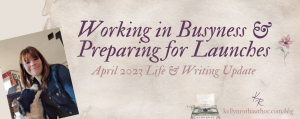
It’s been crazy over here. How ’bout over there?
Honestly, I’ve been meaning to do a life update for a while, but it’s hard to communicate clearly what all has been going on without whining, and further, the whining seems kind of silly because from an outside perspective, it does not sound like a lot.
That said, I decide it was a good time for a life & writing update, so let’s dive into that without any further ado!

I’ve been busy lately. My life has been swamped with work, writing, marketing, and more. It feels like I have been pushing myself harder and harder … with few results. And that’s exhausting.
But it’s also the way my life has often run.
I always blame it on outside issues. “It’s because of my work!” “It’s because of the season of life I’m in!” “It’s because too many people are asking too many things of me!” But in truth, I create my own stress.
I could sit here and list out all my responsibilities. I could talk about my weakened immune system, my mental health issues, or the grief of unexplained infertility. Yet there’s no real value in that save venting, and it’s better to vent in private to people who care about you, so I’ll instead talk about some of the ways I’ve been working on defeating some of my stress, procrastination, etc., in a segment we will call:
Current Tools for Defeating Kell-NessMy launch blueprint! For both Like a Ship on the Sea and Springtime in Surrey, this is vital for me. It helps me keep track of how I’m doing getting these two projects prepped for launch, which I really don’t want to miss in the rush. If you’re on my writing email list, you know all about this one. You can actually sign up now to get it sent to your inbox, if you want it!Seeking out mentorship and prayer. I’ve started doing this more and more lately, because honestly, I need it. There are some amazing women who have been pouring their times, thoughts, and prayers into me lately, and I couldn’t be more grateful. I like to go it alone … but I can’t. I desperately need help, and admitting that may be the first step, but it’s nothing with action.Telling God what-for (sort of). Okay, this is gonna be a more confusing one, but I’ve been a lot more … ahem … honest with God lately. I’ve been pouring out to Him my broken heartedness and angst and begging Him to just make it a little easier, somehow. And He has. In my honesty about the rebellion and anger toward decisions He’s apparently made (with no understanding of WHY those decisions were made on my part!), I have received comfort. And that’s interesting to me and rather unexpected. But there ’tis.Updates on Wild Blue Wonder PressSee the cover reveal announcement for Springtime in Surrey below.My own story is currently with betas! Yay!The other stories are coming along SPLENDIDLY.It’s going to be a THICK book. Like, really thicccc.We’re planning our launch, and it’s been fantastic!I am insanely busy.Updates on Like a Ship on the SeaSee the cover reveal announcement for Like a Ship on the Sea below.I should get a draft back from my editor in mid-May-ish? I’m not sure exactly when, but I’m excited for that. Can hardly wait!The cover reveal stuff is all mostly set up, too.Still working on getting the preorder launch (and preorder goodies) lined up.Patrick and Cassie are OTP.I have been posting about this story a lot on Instagram and Facebook if you want to know more!

Join the cover reveal for Kellyn Roth’s next standalone novel, Like a Ship on the Sea, a Christian historical romance set in Gilded-Era England and America (with stops in Ireland, Italy, and Switzerland).
The cover reveal and preorder launch will take place on Tuesday, May 9th, 2023. You are more than welcome to share any time after that, if it is not possible for you to share the day of!
About the BookIf God asks you to confront a storm, how dare you stay in the harbor?
Lady Mary Cassidy O’Connell has a dream that can be summed up in three connecting ideas: a loving husband, adorable children, and a home of her own. Her mother’s lack of care makes life difficult for Cassie, and an escape is necessary. The plan? Marry Aubrey Montgomery, the man her parents have chosen for her, and find the peace she craves.
Unfortunately, Cassie is uneasy about marrying Aubrey. Her apprehension grows as she witnesses her dearest friend’s loving marriage take place. At this wedding, she catches the eye of Patrick Hilton, son of a wealthy American. Like Cassie, he’s also set to marry a woman chosen by his parents—only, Patrick claims, he is content with this choice.
Torn between her desire for happiness and the knowledge that God is leading her in a different direction, Cassie confronts the impossible decision. Is a loveless marriage of obligation better than being alone, or will she set sail on a voyage without a safe harbor?
Like a Ship on the Sea is the first novel in The Hilton Legacy, a stand-alone trilogy featuring characters from the author’s first series, The Chronicles of Alice and Ivy.
CLICK THE LINK TO JOIN!Or copy/paste this link into your browser: https://forms.gle/Knxox25L7UUm53j2A

Join the cover reveal for the Wild Blue Wonder Press’s first-ever anthology, Springtime in Surrey, a Christian historical and contemporary fiction anthology.
The cover reveal and preorder launch will take place on Tuesday, May 30th, 2023. You are more than welcome to share any time after that, if it is not possible for you to share the day of!
CLICK THE LINK TO JOINOr copy/paste this link into your browser: https://forms.gle/o7R2mFVhESif1or17

TTFN!
~Kell~
P.S.Are you joining the cover reveals? How’s your life been?

Are you interested in getting to know me & my books better?
I want to invite you to my super secret club. I mean, it’s not really a secret, because I’m telling you about it now, but here goes.
Join Mrs. Roth’s Society Column, my street team! We’d love to have you along for the ride!
March 29, 2023
Saintly, Sweet, Sensual, & Smutty: a treatise on the four types of romance novels & how to navigate them as a Christian
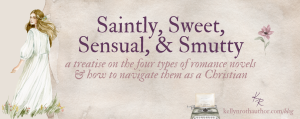
My dear reader, today I am undertaking a task few would approach and fewer still would do with any professionalism. I am fortunate to not be one of those few in the final category. Though my idiocy has driven me to undertake this post, I cannot promise it will be entertaining or insightful in any real way.
That said, I will be attempting to do what the title hints at. I will be categorizing all romance into four categories from a purely level-of-sexual-content perspective, discussing the contents of those types of romance, and further exploring what Christians should and should not be doing.
This post is written for Christians, specifically those who are interested in reading clean romance or in general do not choose to read sexual scenes for moral reasons. To any non-Christian reader, this post is rather a silly one and will not benefit you in any way, shape, or form, so … just know that it’s useless to you if you don’t fall into that category.
As for those of you who are the intended audience of this post, you may find yourself asking a question. A question that I am going to create a header for below and answer.

In this post, I will be pretty frank in the “smutty” section and throughout the post in general. Because this is a post specifically discussing the levels of sexual content in romances, you can guess that some of these discussions were have to do with sex! Read with caution.

When it comes to reading romance novels which by definition MUST BE sexual in nature, you have personal convictions about how much sexual content they will accept in the novels they read (and write, for us authors).
That said, even non-romance novels often contain a bit of “sexual content” (though they don’t have to, and in some subgenres, as we’ll discuss later, shouldn’t) due to the fact that sex is a part of life. In fact, like it or not, sex is how God in His Wisdom decided to start human life after the event of Adam and Eve. So from the very time that Eve was created (probably about five minutes later, once God left them alone for the night or whatever the situation was), sex has existed in this world, and it comes up from time to time. It’s a fact of life. It’s THE fact of life.
So sex exists in fictional novels, rather outright stated or behind-the-scenes. Therefore, we must decide how we relate to it as adults and as readers of the romance genre or of books that contain romantic subplots.
So the point of this post is to break down how I personally view romantic novels and their varying degrees of sexual content, share my thoughts on how Christians should interact with said novels, and admit to a simple fact: I think de-sexualizing romance and romantic relationships does all Christians a big disservice.
Let’s move on now to the next portion of the post in which we will define several key terms.

A romance novel can be loosely defined as a work of fiction that tracks the relational growth between a couple, usually from the beginning of their relationship or a point at which the relationship changes, and continues on until a satisfying conclusion is met in their relationship.
The type of relationship? The type that would lead to love and marriage, of course! From a Christian perspective, as we will discuss below in further detail, this is a man and a woman actively pursuing a relationship with each other.
I will also include this post as I often do: Romance is a Relationship, Not A Genre (I am getting way too much content out of this, Grace).
Christian people/ChristiansI felt a need to define this because honestly, some people get this label without actually, you know, doing any Christian things, and that’s iffy. So here’s the Christian things:
Believes that God loved the world and therefore gave His one and only Son, Jesus Christ, to die for us on the cross and therefore save us from eternal separation from God. Has confessed with their mouths that Jesus Christ is Lord and believed in their hearts that God raised Him from the dead.Believes that the Bible is the one, true Word of God.Believes that things that Bible says are sins are sins and that though we will never hit close to the mark, we should try to avoid things that either tempt us to sin or are inherently sinful to the best of our abilities … not because we can gain anything from it (despite the fact that it’s best for us in the long run) but because we love God and want to serve and obey Him.Everything else? Well, for the purpose of this post, we can ignore that. (Not in general, but for the purpose of this post!)
Christian romanceChristian romance can be defined by the following:
Written by a Christian (^)Written to show a Biblical/Godly perspective of a romantic relationship & glorify God throughoutWritten for Christian audiences

Because maybe now you’re thinking that we’re just talking about Christian romances.
Well, actually, no, because there is not a Christian romance that is smutty to the best of my knowledge using the perimeters below.
So … yeah, I guess? In some ways we’re mostly talking about Christian romance?
But to be honest, Christian romance doesn’t fall over all the categories, so yes, we are also addressing secular romances. Because even if the standards for a secular romance writer are different, the standards for a Christian reader are not.
Moving on.

A HUGE NOTE FIRST: I made this up. It’s all my own definition. This is not peer-reviewed. It’s just me taking a leap and defining terms as best as I can after examining the romance genre since I started reading (pretty much) and seeing a pattern or two repeat. I read a lot of romance, and I’ve read pretty widely across different genres before settling in to my favorite. That’s my “source.” Please don’t take this as academic or think that I’m claiming it is so.
That said, there are some discussions in the final two categories that are based on scientific research combined with my personal experiences.
Also, I named these based entirely on alliteration even when I could’ve chosen better names. Forgive me.

Saintly romance, to me, is romance written by Christian fiction with the express purpose of removing all sexuality from romance.
And it’s fine, for a certain audience (especially middle grade and verrrryyy-young young adult readers). It’s fine as a subplot. It’s fine in general, actually, if we’re honest. It’s not sinful or wrong (though some people may sin because of it; however, that’s a different topic and is hardly the fault of the author in this case). But it is a category that I find hard to get behind despite having no real objections to its existence (and despite, in fact, some of my books falling under this category, arguably speaking).
To be honest, I just don’t enjoy it when the focus on the story is the cleanliness over just telling a good story. I find romances without a little chemistry a little dull, and I think the world has so many tough topics in it that not discussing some of them in an adult novel is … well, lacking in depth.
That said, there are reasons to write these romances, and good ways to write these romances that are enjoyable and interesting, and I know most of my friends and readers do. And I think that’s good. We should all follow our convictions. Many of the best novels in the world fall under this category. A lot of classic novels would fit under the definition purely because of the standards for fiction of the era.
However, those classic novels do not do what a select few Saintly writers attempt to do – they do not stray away from tough topics. They do not attempt to write a Hallmark movie script with a few prayers tossed in or one of those irritating Pureflix movies. And occasionally, Saintly fiction can have a tendency to do this.
Classic novelists are honest, straightforward, and strong in their writing. The best of them tell it like it is, and that’s why they stick with us.
So as I said, nothing about Saintly romances is bad in any way, shape, or form. The issue becomes, of course, when our convictions are forced upon others. Which, as with many things in this article, I will discuss later.
As I mentioned before, what Saintly romance arguably tries to do is keep all elements of sexuality under wraps, from the simplest peck on the cheek to references to past sins to discussions that should probably be had with anyone over the age of 10.
What I also dislike about this genre is often things that are NOT sexual become included under this category. Breastfeeding, for instance. And pregnancy. And menstrual cycles.
Plus, we all know where babies have come from. It should be understood that anyone over the age of five or six knows at least the basics of where babies come from. I’m always surprised when any kid over the age of three or four doesn’t get it, but I’m just a farm kid, so what do I know? (I am 100% dragging my future kids to a farm so they can watch animals mate, be born, and die, like God intended.)
And I get the perspective. “That’s all private stuff! It should only happen in private!” Well, some of it, yeah, but I’ve seen my parents kiss (and I daresay even random people in a grocery store), I’ve had conversations in real life about these topics, and of course I see a pregnant woman from time to time. I’ll even go as far as to say I’ve discussed pregnancy with pregnant women (*gasp*). And there is nothing about many elements of my personal relationship that I would not hesitate to tell a friend or for educational purposes. Why shouldn’t our novels do the same?
Yet some people are more private in nature, or have different convictions about what they will and will not discuss publicly. Therefore, this category continues to be, as I mentioned before, legitimate.
Because Saintly is so much an ideology rather than a set of rules, it can be hard to define the difference between this and Sweet. People have tried. It’s just … never quite sat right with me because there are definitely Saintly authors who cover a wide variety of topics in a wide variety of ways.
However, I will try. Here are some common cliches when it comes to “Saintly romance”:
None of the main characters’ interactions are sexual in any way. No kissing, very little hugging, at most holding hands, and no references to any kind of sexual or physical contact between them. Also, no references toward longing for the same.The main characters show little or no physical attraction for each other. No noticing curves or strong muscles or nice smells. An occasional “she’s pretty” (or slightly more descriptive, at times) may be allowed, but it ought not to be the main focus.The couple is rarely or never alone and it is commented on that this is a conscious choice. Oftentimes these romances will set up a “courtship” structure to share the author’s views about how romantic relationships should be conducted. It goes without saying that there will be no “only one bed” trope.No references to sexual sins. The hero and heroine usually don’t have a “past” or any type, and if minor characters do … well, if there are references, they are done in a way that honestly makes it difficult for the reader to discern what actually happened. In fact, the word “sex” is almost never used (and is often starred out in reviews on sites that don’t have any kind of algorithm to trick???).No references to things like pregnancy, birth, menstrual cycles, birth control, “nakedness” (it’s a book? Without describing it, how do you count …?), etc. If there are references made, they are made in a pseudo-Victorian way that is honestly somewhat amusing to me.Further, when I think of Saintly romance authors and readers, here’s what comes to mind:
A great portion of their platform is dedicated to speaking out against books that aren’t clean and sharing books that aren’t clean.Their reviews are very harsh toward books with any negative content. It takes an incredibly clean book to please them.Usually they’re pretty great at explaining the logic behind their decisions … but not always. That said, because it is a counter-worldly stand to make, they’re probably had to deal with explaining the “why” to people a lot!Some Potential Downfalls of This Genre Are:Romance, sex, and marriage are inherently linked, so dismissing sex completely from your story can be a mistake, especially if you’re trying to write a God-honoring relationship, which MUST include a healthy dose of sex.There’s a risk of creating a sense of shame and even repression in your readers toward sex. This can only happen if they are a “weaker member,” per se, but the risk does exist.You’ll need to remember that even if you’re writing super clean, you still have to go into the humanity of your characters while crafting their arcs. It doesn’t have to be sexual, but it does have to exist.You will need to make extra sure there’s more to your book than it just being “clean.” And more to your platform. And more to YOU as a person and as a Christian. Being holy and set-apart is one thing. Being removed and “better than” from all the tax collectors and prostitutes is another.Some readers who have ADHD and red hair and like border collies might want your characters to kiss once or twice and then pout like a two-year-old when they don’t.Some Potential Uplifts of This Genre Are:You don’t have to worry about tempting anyone to sin in a sexual way because no one is sinning sexually in your book.These stories can hold so much more beautiful intentionality than other categories, and I think that’s fantastic. Romance should be intentional because couples should intentionally want and choose each other.Oftentimes there are less of those annoying tropes because the characters are trying to be so good. And I deeply appreciate this.Your book can be shared with your church. Don’t share them with your grandma’s knitting circle, though, because grandma-knitting-circles like a little bit of smooching.*Your audience wants you. There’s a push for this type of fiction in the Christian world, and you are fulfilling a clear want if not a clear need. Branding all at once becomes easy. After all, you’re clean. Further, in certain genres, like YA fantasy, you are a minority and yet still have that built-in audience. (You are not so much in Christian historical romance, which is perhaps why I get so confused when people are like, “And it’s clean!!!” I’m always like, “Yes, but so is every book in Christian fiction?” I am arguably a minority here.)It really is fun to be able to say, “Even your kid can read it!” Though let’s be honest, half of us don’t write genres kids actually enjoy.*This is a generalization and may not apply to your grandma.
Am I making fun of this genre?
NO. I just think it’s not possible to have every single book in the world fit into this genre.Honestly, I think you should start using this term because I think it’d be a fun way to market yourself.And heck, we’re all Saints, right? (The Catholics have left the chat … sorry, guys. You know I’m so Protestant that I practically glow with it. I didn’t mean to scare ya off, though …)This isn’t a genre I consider myself to write, nor do I really feel comfortable building my platform around the idea that I write clean fiction when I cover so many topics that a lot of clean-fiction-reading folks don’t appreciate. So I’m a little different in that regard.Not all writers who would like to be included in this genre necessarily fall into this genre, and here’s why … because there’s another “clean fiction but not quite THIS” category. See below.One Last Note:Before you go into the comments and argue about middle grade and young YA, please make sure you read the rest of the post. Because I’m talking about adult and young adult romance here. I’ll discuss the place of Saintly fiction in MG and YA later.

Honestly, I think this is what I write. “Sweet romance,” despite the fact that some non-romance topics are less than sweet. (As, I think, it should be.) I like the term sweet because it doesn’t imply “hand it to your ten-year-old.” Though I think most ten-year-olds SHOULD be mature enough to read my books, not all of them are. (At that age, I was rewatching West Side Story and … well, any manner of other things. That’s the one that strikes me as funniest, though. Just a lil’ murder and racism and gang violence and premarital sex …)
And like, I’m fine with that. I’ve made it clear from the start that I write for a 16-25 age range, more or less. And that’s how I think it should be because some of my topics aren’t frequently encountered by the average 10-year-old despite the fact that they should at least have been a discussion topic with said 10-year-olds’ parents. (I am very convinced that children need a gentle introduction by their parents to most topics before they hit middle school age or even earlier, and no topic should be a “shameful” one that can’t be discussed between a parent and a child because that’s just silly … and problematic. But I’m not a parent, so what do I know about the logistics of this? Nothing.)
However, let’s remove ourselves from the discussions of tough topics except as related to sexuality and focus in on what sweet romance, to me, generally entails. Again, made-up definition and made-up terms, but let’s goooo!
Depending on the characters, sweet romance may or may not contain the following: kisses, hugs, cuddles, admittances of attraction/longing in an undetailed manner, etc.I will note that long make-out sessions with descriptions of tongues and petting don’t fit in this genre. Because they’re gross unless you’re actually doing them yourself.Though there are to be no sex scenes, some sweet romances may draw the line on one side or another of fade-to-black. For some, no. For others, yes.There’s less of a focus on defining the relationship. Usually these stories operate a little more like your average romance, which is actually kind of a shame because we could use more intentionality in this genre.All the typical romance tropes that apply to all romances apply to this genre. Take from that what you will.In terms of all the above-mentioned issues such as discussing sub-topics (premarital sex, infidelity/adultery, birth control, sexual abuse and assault, “nakedness,” vague references, backstories, pregnancy, childbirth, and menstrual cycles), there is a wide variety of ways that these are addressed and regarded by readers. Some books are don’t include them, some include them in shallow ways, and some actually address them in meaningful and interesting ways. Most, however, do not consider things like pregnancy, childbirth, and menstrual cycles to be no-no topics.Some Potential Downfalls of This Genre Are:Some readers are not going to like this kind of fiction. Some people will confuse sweet with Sensual or Saintly, which inevitably is frustrating.Tropes can sometimes be super annoying.As can the lack of commitment-based relationships. Basically, if a toxic romance trope exists, these books sometimes feel free to address them. There can be less depth in general because these can feel more like a normal, non-Christian romance in general, even in the Christian fiction genre. It’s not set-apart … and yet it should be.You get to choose how you portray all these wondrous topics you can discuss freely. That comes with inherent risks – such as not addressing them well.Arguably, there’s a wide variety here. If you have strict convictions, you may get burnt … or you may not.Sometimes people will read “sweet” as “less conflict.” I’m not using it to mean that. I actually don’t think “sweet” is the best way to define this type of romance. So it’s harder to market in that way … because the correct term in my mind is “Christian romance.” However, that definitely includes Saintly, so I guess my conclusion is … it’s still hard to define. “Christian fiction that discusses tough, real topics” is so long to say, but it’s the best I can do.Some Potential Uplifts of This Genre Are:There is a lot more freedom to discuss needed topics. If you like tough topics and a little more grit, you can find it in this genre without reading actual sex scenes or otherwise being dragged through the dirt.In general, you’re not tempting anyone to sin unless they are super sensitive. However, at that point, it’s truly not your fault. Do what you can to warn people about your topics and leave it at that.Most people don’t expect Saintly, so usually to general audiences, including most Christians, this counts as “clean.” Despite what some of the louder voices might say.THE SMOOCHINGGG. But without getting so into it that you’re getting uncomfortable.

I feel like you’re probably giving me a skeptical look because you have a question: aren’t sensual books always smutty?
No. I argue that they are not. But … Christians, approach this category cautiously, because you don’t want to walk the line. You want to be far away from the line, right? Or as much as you can, given whatever the plot of your story may be.
Does this mean that we should avoid all sensual situations? I don’t think so. I mean, I arguably think certain scenes of my books count as such (meaning certain ones with Jordy and Ivy in books 4 and 6 because at least pending book 7, Alice and Peter … arguably don’t … Well). I wouldn’t say the entire vibe edges that way, but without deliberately dragging readers into the sensuality of said scenes, there is sensuality.
But I deal with it in a different way than a “sensual romance” author might. With the exception of celebrating a married couple’s intimacy (which I think we’re missing in Christian fiction at large!), usually these situations in my stories come with a heavy degree of regret attached to them. I deal with sin pretty firmly in my series, as you know, while still allowing for the flow of grace.
I think most Christian authors who have books that edge on this do the same, but there have been some exceptions. Let me say this once, clearly and firmly: it was not “just a mistake.” It was a sin.
Some loooooossseee definitions for sensual romances:
More detail and more intensity with the kissing and related actions.More focus on physical attraction.Might spend a bit more time in the scene before the fade-to-black. (You may find yourself saying, “Oh, we’re still here? Ah. Okay … Y’all just gonna … Mm-hmm.”)Writers of this genre are usually pretty pleased with the smooches they write … and with how hot their main characters are … both in general and for each other. Some Potential Downfalls of This Genre Are:Tempting people to sin. It’s not something we talk about a lot except in the sense of purity culture/modesty (because y’all are so obsessed with that for some reason), but it’s a thing. When does writing romance become “causing your brother to stumble”? I argue that it doesn’t begin with sensual romance – but rather with smutty romance – but with every step toward smutty you make on this sliding scale, a few more people, depending on their level of sensitivity, will sin because of what you write. You can’t control that. You shouldn’t even try to! But it means that every word ought to be weighed. When does it stop being an accurate portrayal of a loving relationship (which, yes, includes sexual attraction!) and start being more smutty than sensual? That’s a line every author must come up with for themselves. But as I’ve said before, I generally prefer to err on the side of caution if I’m writing anything vaguely sensual.Honestly, a lot of the authors who write this category seem so naïve to me. Okay, don’t come at me, if you consider this to be your romance category, but I’ll hear them say things like, “Well, no one would ACTUALLY be aroused by these things. It’s a harmless celebration of attraction. All romances should contain this because it’s realistic …” Well, first, it’s realistic from your experience and may some others (mine, for instance), but that doesn’t apply to all people and more than that, all characters, nor should it (at least, pre-marriage). Further, I assume these authors have never experienced sexual sin and don’t understand how it works at all … or have experienced sexual sin and forgot what it’s like to be still struggling with it*. Which is fine. It’s just an observation. Again, I know it’s not the duty of the author to protect their readers from sin, but it is certainly something to keep in mind.
Some Potential Downfalls of This Genre Are:Tempting people to sin. It’s not something we talk about a lot except in the sense of purity culture/modesty (because y’all are so obsessed with that for some reason), but it’s a thing. When does writing romance become “causing your brother to stumble”? I argue that it doesn’t begin with sensual romance – but rather with smutty romance – but with every step toward smutty you make on this sliding scale, a few more people, depending on their level of sensitivity, will sin because of what you write. You can’t control that. You shouldn’t even try to! But it means that every word ought to be weighed. When does it stop being an accurate portrayal of a loving relationship (which, yes, includes sexual attraction!) and start being more smutty than sensual? That’s a line every author must come up with for themselves. But as I’ve said before, I generally prefer to err on the side of caution if I’m writing anything vaguely sensual.Honestly, a lot of the authors who write this category seem so naïve to me. Okay, don’t come at me, if you consider this to be your romance category, but I’ll hear them say things like, “Well, no one would ACTUALLY be aroused by these things. It’s a harmless celebration of attraction. All romances should contain this because it’s realistic …” Well, first, it’s realistic from your experience and may some others (mine, for instance), but that doesn’t apply to all people and more than that, all characters, nor should it (at least, pre-marriage). Further, I assume these authors have never experienced sexual sin and don’t understand how it works at all … or have experienced sexual sin and forgot what it’s like to be still struggling with it*. Which is fine. It’s just an observation. Again, I know it’s not the duty of the author to protect their readers from sin, but it is certainly something to keep in mind.*Everyone deals with past issues differently, so some people become hardened toward past triggers while others become more sensitive to them than anyone else.
Some Potential Uplifts of This Genre Are:Honestly, you can say what you want, but I believe this firmly: we need more portrayals of healthy, godly attraction between married couples, and we need to understand that before getting married, you should know whether or not you can bear sharing a bed with a person. You don’t want to marry someone you don’t desire. It’s just not a good idea.To write this genre as a Christian, you’ll definitely be forced to pray about these issues a lot in order to thoughtfully write this kind of romance. And more prayer is never a bad thing!

Smutty romance is an easy one to approach as a Christian writer: no.
There is no need for Christians to write or read smutty romance. Smutty romance (erotica, steamy romance, etc.) has the same effects on the brain as watching pornography.
Now, there has been some debate in the Christian community lately about whether the reason more women tend to read porn than watch porn (the actual percentage differences between women who watch porn and men who watch porn is not that different, depending on who you ask, but it’s still there: “one survey from Australia estimated that about 4.4% of men and 1.2% of women consider themselves addicted to pornography” — source — and other studies have found porn use to affect about 60% of men and 30% of women) is because of the emotional pull of romance. I think … yes but also no.
Yes, there is usually an emotional element to erotica romance. There’s often some kind of storyline. The characters often are “in love” and stick together after the story is over, much like a regular romance. Everything is usually consensual or at least mildly consensual (unless it’s feeding a kink, as I mentioned later in the post). Yet I think it has more to do with the fact that erotica romance is written with a female protagonist and is in general not male-centric. And I just don’t agree that the actual emotions of a romance novel are bad (see this post), so that argument has never made sense to me.
That said, the feelings of sexual arousal are not only sinful but have horrible negative effects on the brain. Pornography itself is not what is damaging but rather the natural human response to be aroused by it and therefore to associate pornography (or in this case, smut) with the emotional, physical, hormonal “hit” you get from arousal (and of course orgasm, but it happens regardless).
The other issue? It’s as addicting as porn. Now, granted, so is coffee (despite the fact that coffee is not a sin and therefore cannot be spiritually damaging unless it becomes an idol), but addiction to receiving pleasure from someone other than your spouse is problematic, not to mention all the myriad of other symptoms, including but not limited to:
Decreased libido in any other sexual situation than while engaging with pornography.Lack of attraction for spouse/other partner.Increased risk for depression, anxiety, alcoholism, job loss, and money problems.Lack of energy.Neglect of other duties/responsibilities.Decreased self-esteem in both men and women.A mentality that sexual intimacy is violent toward women.Some Potential Downfalls of This Genre Are:All of the above! But mostly, it’s a clear case of sinning (by publishing these types of books and in some cases, by writing sex scenes in the first place*) and causing others to sin with you (as they read the book).These types of romance are generally swamped with dubious consensual consent, kinks that may be harmful or damaging (though they may also not be, but that’s between you and your spouse), unfair standards for both men and women in regards to both the practicalities and actions and responses of/to sex and physical appearance/attributes, and an abundance of really unlikable (cruel, abusive) characters. Now, there are completely healthy relationships in these types of books! Don’t get me wrong. I am not of the widespread belief that all secular romance must contain great evil. That said, there is such a tendency toward perversion in these romances that I cannot healthily ignore it.*I mean, theoretically, you could write a self-insert for your spouse, and that’d be okay, so I was hesitant to completely decry ALL writing of pornographic literature. But the problem is, involving fictional characters (or anyone who is not just you and your spouse) makes it iffy in a hurry!
Some Potential Uplifts of This Genre Are:Uhhh …?It’s fine for secular audiences. *shrug* I mean, why wouldn’t you?

It’s so hard to define an exact boundary here because honestly, what might be smutty for one person is sensual for another.
Like many things, Christians get flack about not understanding that “smutty” is a spectrum. Fortunately, this is one thing Christians can get away with not caring about, unlike other things. Because we all should know that reading smutty books has the same effect on our brains are watching porn*, and we don’t do that. That is the assumption I am operating under as a Christian writer who writes for Christians.
*Sources: 50 Shades of Grey Matter: Your Mind on Smut | Anti-pornography group has a pointed — yet simple — message about the dangers of smut | Are romance novels the equivalent to pornography? | Is Erotica Bad for the Brain?
That said, roughly speaking, smutty romances deliberately arouse the reader by including sexual situations that are certain to cause said reaction. Since various readers react at various levels, it can be hard to gauge this. Some people are just less easily aroused or just have been exposed either less or more to sexual situations (exposure affects different people differently) … but that doesn’t mean there’s not harm in these kinds of situations due to some of the points discussed above. Further, “you really don’t know until you try,” and why are you trying to find out what will and will not have these negative effects on your brain?
From a moral standpoint, involving ourselves with sexual situations outside of our relationship with our spouse is obviously a sin. And I argue that that does include fictional characters, even ones of our own creation.
So what then? Is the difference between smutty and sensual simply on-page sex vs. off-page sex? That still doesn’t take away all our issues. Is there a point at which fade-to-black sex becomes potentially smutty? I argue that yes, there is a point at which describing the lead-up to sex is smutty because, after all … foreplay. You know, the thing that is literally meant to … be arousing? That’s? The? Whole? Thing?
I guess that’s the main thing. You want to stay out of a characters’ foreplay as much as the actual sex. Because again, we don’t need to be there for that.

Now I’d like to cover a few points that I think come up regularly in this discussion.
Historical FactorsI disagree with the concept that historical couples weren’t very affectionate. Because we were still humans, and though some societal restraints may have affected some, it did not affect everyone. In public? Perhaps. But if you know anything about most people in most eras, it’s that the way they acted in private was usually quite a bit more relaxed.
Also, keep in mind that half of propriety comes down to parody or extreme situations. There is a dissonance between our understanding of history due to fictional accounts not always accurately portraying the era they are set in.
I’ll quote another article of mine:
LITERATURE DOES NOT ACCURATELY PORTRAY REALITY 80% OF THE TIME.A lot of what we used to form our opinions on historical eras these days seems to come from one of the following sources.
SATIRE ABOUT THE ERA.Example: Jane Austen, Mark Twain.Not necessarily accurate because it often exaggerates certain elements of the era (or all elements). Since you didn’t live through the era, it can be difficult to discern, without historical record, what is and is not satire.“LOVE INSPIRED” (IDEALISTIC, SWEET, LIGHT) FICTION.Example: Lucy Maud Montgomery, Louisa May Alcott, Maud Hart Lovelace.Often gives an idealistic, sweet, or otherwise light-hearted take on the era, ignoring bigger problems or things that are “hard” (much like Christian fiction sometimes does today).CHILDREN’S FICTION.Example: Martha Finley, Laura Ingalls Wilder.Well, you wouldn’t expect children’s fiction to discuss big, adult life issues, would you? At least, not most of them. Also, there was a tendency in Victorian children’s fiction to moralize and focus on presenting perfect role models. Nothing more unrealistic than that.HEAVILY-PREJUDICED FICTION.Example: Margaret Mitchell, Harriet Beecher Stowe, Upton Sinclair, John Steinbeck.A LOT of writers fall into this category. They portray one side of an issue to make a point, and oftentimes, they use their powerful writing to sway their reader one way or another.“THINK” FICTION.Example: Henry James, Oscar Wilde, Nathanael Hawthorne.More focused on some kind of particular thought process, point, etc., than anything else. Often don’t have time to perspectives they aren’t willing to explore and/or do nothing but explore perspectives. These are probably the more accurate to the time pieces of the bunch; however, they still lack actual reality.FICTION WRITTEN ABOUT THE ERAI won’t even both giving examples, but there are a lot of these. Especially in the mid-1900s, as communication spread, historical eras became more talked about … and often the way the Victorian era in particular was talked about was based on inaccurate stories from grandmothers and from suffragettes and … well, don’t get even get me started on corsets.Then of course there’s science fiction, comedies, and such, but we won’t even discuss that. We all get that those aren’t necessarily reliable historical resources.
Basically, we need to do better. We need to dig deeper. We need to expect fiction to be just that … fiction. Not our own personal little guidebooks.
Basically, if you’re going to cover anything, make sure you actually understand it. And don’t say that no unmarried couple in the Edwardian era would ever have kissed when this is simply not true.
A Word on YA & MGI really think middle grade should be saintly when it comes to romance (if there is any at all), and I kind of feel like YA should, too, though I think we should be encouraging young adults to read adult books anyways. That said, putting sexually charged situations in middle grade is kind of … pervert-y. I mean, leave it to their parents.
The role of personal convictions in writing & readingRegardless of any of this, regardless of anything, personal conviction will always impact every area of our life, and for choices such as what we read or write, these are even more vital. Approach all elements of your writing and reading, but especially your writing, with prayer.
And if you find your convictions are different than mine … that’s not even a situation in which we need argue or have further discussion about it. It’s a CONVICTION. You get to have yours, and I get to have mine. All right? All right.
Conclusion and Final ThoughtsI honestly don’t know how to wrap this up. We’re 6,000 words in, and that’s significantly longer than it ought to be. Yet here we are, and I honestly feel like most of it is necessary. I hope this was helpful for you in some way … or at the very least, interesting!
So I leave you with this monster of a post and one final sentence: don’t destroy me in the comments. All I did was make up a bunch of random stuff and put it together in a somewhat feasible way to share a bunch of miscellaneous observations about the romantic genre and my approach to it.
TTFN!
~Kell~
P.S.Well, thoughts? This is all made up to a certain degree, though some of the research behind it is based on facts. You know, the parts where I linked sources because that way I won’t have to bother with them later.

Are you interested in getting to know me & my books better?
I want to invite you to my super secret club. I mean, it’s not really a secret, because I’m telling you about it now, but here goes.
Join Mrs. Roth’s Society Column, my street team! We’d love to have you along for the ride!
March 22, 2023
This Life of Mine by Victoria Lynn | Bookish Spotlight & Launch Day Celebration
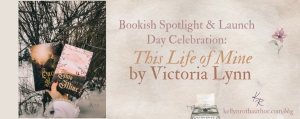
Today is the day! This Life of Mine by Victoria Lynn has released into the world and is available wherever books are sold! This book is The Chronicles of Elira: Book 2 (the first being the book you’ve probably heard everyone in the indie world talking about, Once I Knew!).
This Life of Mine is launching with Glory Writers press, which is … well, a mix of everything. If you don’t know about The Glory Writers, it’s a fantastic source of information, services, and now, an up-and-coming HYBRID PRESS (kind of like what we’re doing with Wild Blue Wonder Press, but a little different).
I linked their website above, but you can check them out on Instagram (great advice, challenges, services, etc.) or … make sure to give their NEW Instagram account a follow, Glory Writers Press. I’m really excited to see where this goes!
I’m really excited for Victoria – this book looks phenomenal, and honestly, if you want a crash course in how to market a book, how to serve your audience, and how to be an authentic, awesome girl-for-God’s-glory (ya know, a girl boss but Christian?), you should just follow her already! She’s fantastic.
I’ve actually read most of the first book and then my Kindle Unlimited subscription expired (we is broke?) but I renewed it this month, and it’s high on my list. So far, it’s been fantastic! I just need more time to read, plainly, so I can finish book 1 … and move on to book 2!
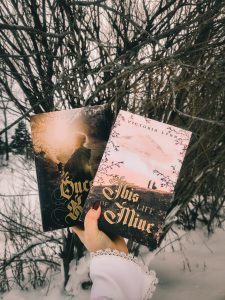 About This Life of Mine
About This Life of MineMarcus is tired of losing those he loves. The last shred of his childhood has been uprooted, and he feels alone… again. When the ruler’s new policies take effect, the anger of the Rusalkan mountain king is unleashed upon the borderlands. With refugees streaming into Elira by the hundreds, the stories from the wall are horrific.
Marcus joins a convoy to lend his medical skills to those in need at the Eliran border. What he finds there requires him to face his own deformities. Will he be able to overcome them? Or will his life forever be marked by suffering and sacrifice?
Dilara’s life as a slave in Rusalka was anything but idealistic. Consumed by a system designed to use, abuse, and discard the likes of her, she has been taken through the very depths. Carrying a traumatic secret and wounded in her frenzied escape, she finds herself with an unlikely protector and an even more confusing relationship. Can she traverse the waters of this new life of hers and make it her own?
Find it on Victoria’s Website ~ Buy on Amazon ~ Add on Goodreads
Some Creative Materials(because these are the most fun)
THIS LIFE OF MINE PINTEREST BOARD
About Victoria LynnVictoria Lynn has an insatiable desire for truth, light and beauty.
Traveling to destinations of beauty created by our Heavenly Father, reveling in creative pursuits that fill her with joy, or pouring her heart into words of life are some of her favorite things to do.
She seeks to bring the life giving words of the Savior to a dark and broken world that desperately needs to know of His sacrifice.
A writing and publishing coach, author, journalist, seamstress and creator, she loves spending time with any of her 8 siblings, exploring her native state of Michigan, and sewing gowns fit for a princess.
Website: https://victorialynnblog.com/
Newsletter: https://rufflesandgrace.us19.list-manage.com/subscribe?u=e602ab14198d6bebec5c376e7&id=42b9eac2c0
Instagram: https://www.instagram.com/victorialynnauthor/
Tiktok: https://www.tiktok.com/@victorialynnauthor
Facebook: https://www.facebook.com/victorialynnauthor
Goodreads: https://www.goodreads.com/author/show/447587.Victoria_Lynn

TTFN!
~Kell~
P.S.Have you read anything by Victoria Lynn? She’s been around the indie community as long as I can honestly remember, and I have such fond memories of the “early days” (uh, for me) and chatting with her and being a “Chatter Box Girl.” (Does anyone else remember that? What was that, five years ago now? It feels like an eternity.)
I was also blessed to be able to meet her in-person once, and I would love to do so again if God ever makes it happen. We just, you know, live on opposite sides of the country, more or less.  I’ll see her in August for the YWW Conference (again, God-willing).
I’ll see her in August for the YWW Conference (again, God-willing).
Honestly, I’m so glad Victoria (and The Glory Writers team) are making such a splash & putting out such great content. You can tell the world – especially the Christian indie world – is so excited about this because it is so needed. We are starving for clean fiction that still addresses tough topics in a godly light. We need more people willing to shine light in the dark places while not denying that they were very dark indeed to begin with – hence the need for light.

Are you interested in getting to know me & my books better?
I want to invite you to my super secret club. I mean, it’s not really a secret, because I’m telling you about it now, but here goes.
Join Mrs. Roth’s Society Column, my street team! We’d love to have you along for the ride!
March 15, 2023
Introducing Like a Ship on the Sea
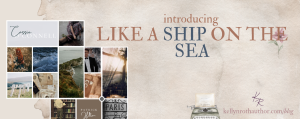
My next book is releasing in September 2023, so now’s a good time to talk about it, right? Let’s do a book intro, talk about our main characters, and in general just reveal some information!
Introducing Like a Ship on the SeaThe Blurb
If God asks you to confront a storm, how dare you stay in the harbor?Lady Mary Cassidy O’Connell has a dream that can be summed up in three connecting ideas: a loving husband, adorable children, and a home of her own. Her mother’s lack of care makes life difficult for Cassie, and an escape is necessary. The plan? Marry Aubrey Montgomery, the man her parents have chosen for her, and find the peace she craves.
Unfortunately, Cassie is uneasy about marrying Aubrey. Her apprehension grows as she witnesses her dearest friend’s loving marriage take place. At this wedding, she catches the eye of Patrick Hilton, son of a wealthy American. Like Cassie, he’s also set to marry a woman chosen by his parents—only, Patrick claims, he is content with this choice.
Torn between her desire for happiness and the knowledge that God is leading her in a different direction, Cassie confronts the impossible decision. Is a loveless marriage of obligation better than being alone, or will she set sail on a voyage without a safe harbor?
Like a Ship on the Sea is the first novel in The Hilton Legacy, a stand-alone trilogy featuring characters from the author’s first series, The Chronicles of Alice and Ivy.
The Series
As noted above, Like a Ship on the Sea is the first novel in The Hilton Legacy, a trilogy featuring the three Hilton siblings as they navigate life and love!
The whole series will discuss the complicated legacy left by their parents and how each sibling responds to the burden of the past and the opportunities of the future. It spans various portions of the 1880s and will feature … well, a lot of very different stories.
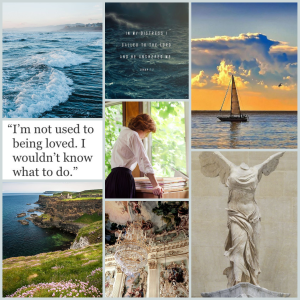
Above it my attempt at an aesthetic for Like a Ship on the Sea, but the next two are actually done by Grace A. Johnson. (Thank you, Grace!)
Introducing Cassie O’Connell
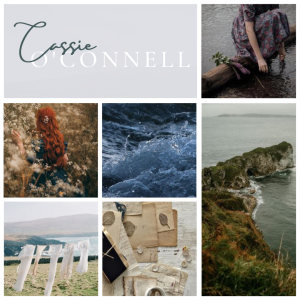
You may be familiar with Cassie, or Lady Mary Cassidy O’Connell, from The Chronicles of Alice and Ivy. If you don’t remember her, well, she’s Alice’s best friend from boarding school. They debut together and share a lot of other experiences. Cassie is Alice’s bridesmaid when she gets married (Ivy being her maid of honor).
A few facts about Cassie:
She’s Irish and a member of the English nobility, which leads to some mixed feelings from her fellow peers.She resembles her very Irish grandmother.Said grandmother apparently married her grandfather despite being a fairly Normal Person and him being an Earl. I kind of want to write a short story about them some day!Cassie was shy and timid as a child (and a teenager, and a woman), but in recent years, she’s starting to come into her own, with God’s help. Seeing her mature has been so fun.She’s probably one of my favorite female characters to date, honestly. Mostly because she actually listens to God even though she is flawed, and she’s softer than a lot of my heroines, too, which is just interesting.Cassie is an A+ confidante. Maybe better than Nettie. I know that’s a bold claim, but I am MAKING IT.Years of Alice have worn away whatever nerves she had and now she’s pretty calm. Honestly, she’s unflappable, in general, despite having miscellaneous fears, uncertainties, and wild moments to deal with throughout the book. And I find that terribly admirable.Longs for adventure in the “great wide somewhere.” Probably would be a really epic Disney princess, honestly.Introducing Patrick Hilton
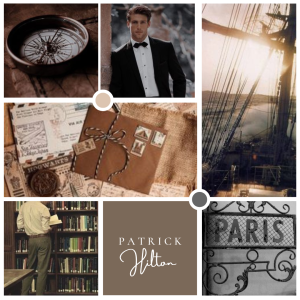
Patrick is a new character, but he enters the scene as the son of an old friend of Philip Knight. An American, an heir to a massive shipping company, and a product of years of bitterness between his parents, Patrick was an interesting character to write. He has a lot of growing to do! And watching that growth was painful.
The physical representation of people-pleasing and parentification.Loves his sisters, Lorelei “Lore” and Gwendolyn “Winnie,” intensely. Also intensely annoyed by them, but that’s probably because of their misguided matchmaking attempts.He laughingly calls himself American royalty, but he’s not far off.Loves children. Like, this is a man who sees a baby and Must Hold The Baby. (He is the same way about puppies.)Probably insanely privileged, but somehow it just doesn’t feel like it … maybe because his daddy works him like a slave. But still, he will probably have some work to do to be grateful for what he has in the future.Probably would be on 5-10 different anxiety meds in the modern-day world. (He would take them rather than addressing the underlying problems, which have to do more with his circumstances than anything.)He’s too forbearing. With his sisters, with his friends, with his parents.Has a Belgium shepherd (only this is before the breed was officially created) named Bellona “Bell.”Lots of traveling, but only for work reasons.And that’s all I’ll share for now! But I’ll come back with more thoughts some time soon, hopefully!
TTFN!
~Kell~
P.S.Are you as excited as I am? Do you have any predictions about this next book? I’m curious to know if you have any guesses about what it’ll be about!

Are you interested in getting to know me & my books better?
I want to invite you to my super secret club. I mean, it’s not really a secret, because I’m telling you about it now, but here goes.
Join Mrs. Roth’s Society Column, my street team! We’d love to have you along for the ride!
March 8, 2023
Villainizing Romance & Other Dumb Things Christians Do
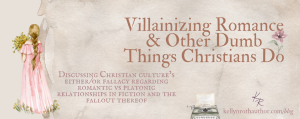
A bold title, ain’t it? I hoped it would attract your attention, and I hope the post that follows is worthy of your attention. If it isn’t, well, what can I say? I am only human, and though I have put much thought and many words into this article, perhaps it will still fall flat for some.
That said, I do have something to say, and I will say it with as much boldness as I can muster:
I don’t like how Christians discuss romance in fiction.
Specifically, in Christian fiction, but this applies more broadly to all fictional works as well.
My thesis is simple: we have become a culture, in Christianity, that either glories romantic relationships in and outside of fiction to an unhealthy extreme, focusing in on marriage-seeking couples as the ideal of God-serving people …
Or we have tossed out romance completely in an unhealthy and downright impossible way that leads to nothing but frustration, cruelty, and perhaps even sin.
If you thought my title was meant to incite the rabble, well, here I am making my introduction even worse! But I don’t mean to incite the rabble—mostly because I am the rabble, and I am too lazy to be incited.
That said, maybe you can think along with me and wonder if, perhaps, there’s something silly about the way Christians approach romance in fiction (& in general, though that is far too big a subject for this post).
The Christian Culture Toward RomanceThere are two types of Christian cultures when it comes toward romance, and they are equally bad. The first is easy to diagnose—an obsession with romantic relationships that may be best summed up by that elderly woman from your church who is constantly asking if you have a boyfriend and recommending her nephew as a potential option when you say “no.”
Okay, maybe that’s a bit unfair, but there is certainly a subset (even a fairly large subset) within Christian culture that prioritizing getting those rings glued on tight ASAP as a must for all men and women, but especially women, everywhere.
And romance just seems to confirm that.
Now, though I disagree with the concept that the secular patriarchy is responsible for promoting the importance of marriage within the Church, this is one area where I’d give a nod to today’s culture—and the culture of romanticism in general.
Romantic love and therefore marriage is the end-all, be-all. For both men and women, whether you see if that way or not. Women who don’t seek marriage become old maids, bitter and resentful and in possession of far too many cats (as if there’s such a thing). Men who don’t seek marriage are also bitter, but in a uniquely “I’m scarred by my past and can’t open myself to love” way (because believe it or not, women are writing this narrative, and women are more sympathetic to men than to themselves!).
The church has fed into this, prioritizing romance and marriage over all other relationships, callings, states of being … whatever you want to call it, it has become ingrained into Christian culture (in Protestantism, at least) that you should marry, soon, and raise a healthy batch of pretty babies.
Now, I love that, actually, to a certain degree. I married pretty young, am pleased with my church, and desperately want a large family. But that’s me—and when I talk about me, I never mean it to apply to anyone but me. There are many, many Christian men and women who will never marry or who perhaps shouldn’t marry. The command was not that we should all marry, but that we should do it if we can’t help it (1 Corinthians 7:2; 7:9).
Look. Marriage is beautiful. It is the only relationship that is a truly perfect representation of Christ’s relationship with and love for the Church. That said, is it the end-all, be-all? No.
And Christian romance should reflect this in being both taking the relationship with the weight it deserves and in showing that it is not the sum total of the characters’ lives and in particular, their relationship with God.
The Christian Culture Against RomanceAnd the alternative, proponed largely by progressive groups, single women, or people from all groups who are fed up with the silliness of most romance novels (which would technically include me—I just arrived at a different conclusion) …
Romance is BAD.
Now, I feel like there are two subsets of the “romance is BAD” group.
1: There is too much romance in fiction, and
2: Romance is just bad.
I’ll address the latter first:
Part 1 of Anti-Romance: Romance is BadThat’s silly.
Don’t be that way.
God created romance and romantic love and sexual intimacy is a part of that, too, so stop it. *sprays you with a water bottle*
Okay, that was way too condescending for me to just leave it. I’m not that way—try as I might, it does not sit right with me to disregard a whole sector of my audience that way even if I disagree with them.
The first thing I’d say to the “romance is bad” (or mostly bad) is this: Romance is a Relationship, Not a Genre. That blog post lays out a lot of great points (written by Grace A. Johnson) which I deeply appreciate.
The second is … Well, let’s actually take a moment to come to the root of the majority of the “romance is bad” arguments I’ve seen, and it’s this: romantic fiction shouldn’t be consumed unless you are in a romantic relationship because it tempts the reader to longing for romance. And, uh, other … temptations.
Okay, fair enough. Let’s take these points on a bit at a time.
The Longing for RomanceFirst, the longing for romance. Okay, why not?
If you were not meant to long for romance, and if you are a Bible-reading, pray-without-ceasing, God-serving reader, you should be able to discern that even while reading romance. So instead of blaming the genre—or anything—for your sin, blame yourself and deepen your relationship with God.
Granted, this may mean removing romance novels from your TBR list for a while, but they are not the problem. You are the problem. Be accountable for your actions. I promise you, the sin was always there—the romance novel may just have brought to light what already existed within you.
And really, doesn’t that make the romance novel a tool?
It is also important to call yourself to discernment rather than throwing every book under the bus. Use all fiction you consume to sharpen your skills of discernment rather than requiring that every novel you read is inoffensive and trivial.
Further, this argument ignores all the good effects romance novels can have. In my personal life, I’ve seen again and again how romance can show us a true vision of God’s love for humanity as well as our need for companionship.
Let’s move on to the second point.
The Temptation to SinUsually this is sexual in nature, as people will argue that romance novels are basically a soft intro into pornography or something of that nature.
As someone with a history of “other temptations,” I fully understand the depth of “temptations,” and I think the influence of Christian romance on temptations is very overstated. In fact, it’s borderline nonsense, if we’re talking about quality Christian fiction novels written by strong Christians. Which is 90% of what I’ve read, regardless of what people may say about the inherent goodness (or lack thereof) of this subgenre. (Maybe I’m just pickier about what I actually read than y’all.)
Why? Because from the beginning of my reading of them, Christian romance has saved me from “temptations” by turning me back toward reality, Christian relationships, and most importantly, God. It continues to do this for me daily by helping me acknowledge and turn away from my own continued temptations (as these do not stop in marriage because nothing but God can heal a sin—especially not a human relationship).
Here’s another point in this variation of the argument. I’ve seen the verse from Song of Solomon, “Do not stir up or awaken love until it pleases,” used to justify not showing young women romantic works until they are married.
To me, this seems a stretch of an interpretation of a largely sexual verse set within a largely sexual work. (Just to clarify, I disagree wholeheartedly with the interpretation that Song of Solomon is largely figurative or that the poetry is not inherently sexual or that it’s just about God’s love for the church. Sure, it has elements thereof, but when studied with an open mind and an understanding of the era’s poetry, it reveals that is also about the beauty of married love and in particular, sexual love within marriage.)
But let’s separate ourselves from the verse and the Bible and focus in on the thought process behind this. The question posed is, “Does reading romance novels cause young women to have their sexual or even simply romance-related thoughts be awakened too early?”
Yes and no.
Here’s my take:
Worldly media does that to you, if you’re unaware of it. We are bombarded with worldly romantic and sexual messages that make romance seem like the end-all be-all, especially in the women-centric romantic fiction genre that prioritizes romance relationships about all else.
But you can again use discernment to see that and therefore protect yourself against it. One of my favorite memories as a young teen is watching Gilmore Girls with my mother and seeing the real-life (and yet fictional, lol) consequences of sexual immorality and even just emotional intimacy in unsure relationships. Oh, and what it means to be a commitment-phobe. Oh, and why … Okay, lots of lessons in that show.
That’s what discernment does, folks. It turns everything into a fun lesson!
But with Christian fiction? Eh. Once again, use discernment, but I feel like Christian fiction is doing a better and better job at differentiating itself from the modern take on romantic relationships and presenting a godly model. (There are notable exceptions.)
And guess what? We need godly models of romantic relationships. NEED them. And we need to stop demonizing romance simply for existing.
Personal storytime: I have known many Christian families who have doomed their children to misunderstanding romantic relationships and sexuality, to hiding all hints of romance and sex in their own lives from their parents, and to struggling for years to establish a healthy view of romance and sex if they ever did at all.
Leaving a girl’s heart empty of any knowledge of romance and sex will not make her desire the good, God-approved version.
It has to be fought for, looked for … LONGED for.
If there’s an emptiness there in the first place (some of us don’t have this, but some of us do—not all people are created equal, and not all people even care about romance and sex that much—really), it will be filled by something. It’s the choice of the parents and then, as time goes by, it should be the choice of the teenager and then adult, what goes in. Because “nothing” is not a legitimate answer.
It applies to other areas of life: you cannot remove a bad habit by just removing a bad habit; you must replace it with something healthy. You must take out the weeds and then plant the flowers, because if there’s dirt, it’s gonna have something in it.
So choose what kind of information you will fill your head with or allow your child’s head to be filled with. If you give no information, your child (or your brain) will probably make up their own—and guess what? Kids (and brains) are pretty evilly imaginative—and the more you hide something from them, the more they will make up what that something is.
Romance exists in this world. What you choose is how you view it.
Now, granted, you can’t save your child or yourself definitively. I’m a good example of someone who was given all the right tools and simply chose my own path for a number of years. That said, there is such a thing as giving them a good start.
But is all romance inherently evil or even inherently unhelpful? Does it all contain the potential for sin? Is there no such thing as helpful and edifying romance, regardless of who you are and what your background is? Certainly not.
With that out of the way, let’s discuss the alternative “romance is bad” conversation: there is too much romance!
The Solution to Too Much Romance? More Platonic Relationships!This one I have a hard time talking about because I feel like it’s much more nuanced. Because yes, the world is oversaturated with worldly romance.
But I’ll say it again for those in the back who might not have gotten my true point here:
The WORLD is oversaturated with WORLDLY romance.
So if you read primarily secular YA fantasy (which is fine! I’m not judging you; I’m just pointing out that it is going to contain some non-Christian elements!), yeah, you’re probably seeing a real problem. The world is obsessed with worldly romance. And why shouldn’t it be? It’s the world! (I will never stop being annoyed with Christians for expecting the world to be Christian. What Bible are you reading?)
As one of the few things that God created primarily for unselfish pleasure*, sexual love is an easy thing to pervert. So easy, in fact, that it takes a ton of effort to keep it pure and loving even in the strongest of Christian marriages.
*I feel like people are gonna come at me for this, but in truth, sexual love should be all about pleasing your husband or wife, not all about you. But obviously if both of you are Christians who want to have a successful marriage, and you should allow nothing else because otherwise your Christian marriage is gonna get good old-fashioned perverted, you should be mutually going about and beyond the call of duty to please each other. So basically, if you’re not getting as good as you give, put on (take off?*) your big girl pants and communicate like a grownup because it’s supposed to be mutually pleasurable. *shrug*
*I’m sorry. I couldn’t resist.
When divorced from Christianity and from marriage, all sexual and therefore all romantic love falls into unhealthy and evil patterns very quickly.
And almost any secular romance will reflect this in some way (though not all, because the ideas of godly romance are also a big fixture in our culture, and even secular creators can reference it).
Yet I disagree with the concept that there could ever be too much Christian romance. I don’t think we could ever write enough beautiful relationship featuring a man and a woman loving each other in a godly way.
That said, are there not enough stories in certain literary genres featuring platonic relationships? Sure.
So write them! And read those that are written! But you don’t have to diss romance in the process. And don’t close your mind off to it completely, either.
But before I go off this subject:
Are Platonic Relationships Equal to Romantic Relationships?This is a conversation subject I’ve heard often. “Romance are bad because they make romantic relationships seem like the only relationship or even the best relationship.” Yeah, I get that perspective. Yet I think there is a reason why we elevate romantic relationships in the way that we do.
The first part does have to do with sin. If sin can’t make us disregard romance, or pervert romance, it will make us elevate us to a status above our relationship with God. This is bad.
However, the other parts are actually healthy.
Healthy Reason #1: a romantic relationship was the first ever human relationship and the one God originally gifted to humanity when He first created humans. We value it, therefore, for obvious reasons. God didn’t make Adam a cool bro or a son or a mother. He made him a wife. (You could argue that was just for practicalities sake, because there are some things Adam and his Cool Bro could NOT do once the human race needed to, um, you know … expand … but still.)
Healthy Reason #2: romance is inherently different from a friendship. It’s important to note that God has compared His relationship with us to just about every type of relationship. However, marriage is the one that is inherently meant to be a picture of God’s love for and relationship with the church. It’s honestly a pretty perfect metaphor, or as close as one can get with sinful, imperfect humans.
Honestly, sometimes I can feel like the conversation easily disintegrate into “I just hate romance” with no qualifiers, and I don’t think that’s fair or what anyone truly means when they say that. Let’s talk about that for a bit.
What Do We Really “Hate” About Romance?I think there are some things we hate about romance that are bad and yet seem to be featured in every romance.
I could sit here and list trope after trope, plot point after plot point, and character after character, but it gets down to this:
A lot of romances, influenced by the world and divorced from God’s original intent, fall into worldly sins that make romance unbearable as a genre. Therefore, the solution is not to cast off romance, but to write better romance.
A Subgenre of the Discussion: Romance in Middle Grade and (Some) Young Adult FictionThis is one area where I think romance is unnecessary.
Why?
Because there is a certain age in our culture where romance is unnecessary. These audiences are largely comprised of populations who need to see romance* … but probably not have their own romances.
*In the sense of seeing healthy adults like their parents, grandparents, aunts and uncles, older cousins and siblings, family friends, their church, Bible stories, family films and books that include romance … there are so many options!
Further, a healthier relationship with platonic relationships is very needed in our culture. But if we had a healthy relationship with romance to begin with, it would be a lot easier to have a healthy relationship in all other areas.
Yet at a young age, in middle grade, it is best that kids are exposed to healthy relationships between adults—not hormone-fueled or nonsense-fueled relationships between children. And in the young adult genre, it’s very important that young adults see both healthy romance AND healthy friendships, because that is an important time for community-building and learning to relate to other humans in a platonic way.
So when I make this discussion, I am largely leaving those two genres out of it, which I think eliminates 90% of the people who are concerned with the amount of romance in fiction.
In Conclusion: Choose the Middle-GroundThere is rarely such thing as a healthy extreme. There never has been, nor will there ever be. God Himself shows this clearly by being the most dual-purpose Thing* in existence.
*If y’all think that’s disrespectful, well, maybe it is. But God is inherently multi-faceted while also being one, always and only GOOD, Being. He is also inherently steady, even, and gentle, even when He has no cause to be. His anger and judgments are slow but decisive, strong, and intense when they arrive. And we had best seek to emulate that in every way possible.
Honestly, if nothing else, we can stop with the finger-pointing and holier-than-thou attitude. Romance is not evil. Not reading romance doesn’t make you special or pure or cooler than the rest of us. Yet neither does enjoying romance give you an edge on others (unless others are completely walling themselves off from all romance like a good Puritan, in which case … you’re a little better than those people #sorrynotsorry) (and on the opposite end of the spectrum, not reading romance is better than the extreme of only reading romance or reading smut or finding yourself constantly tempted to sin by romance … any number of things).
Look. It’s okay to not like a certain plot or genre. But it’s not okay to dislike a certain kind of relationship that is God-ordained.
In conclusion, with 3,000 words in this article, I leave you with this: villainizing romance eventually comes down to shooting yourself in the foot in many cases. Not always, but many of us are created to desire romance and will someday have real-life experience with it.
Anyway, it’s up to you to not read romance if it’s not good for you or you don’t want to. I don’t like reading mysteries because I’m impatient. I don’t read a lot of Christian nonfiction because 90% of it causes more troubles in my weak lil’ mind than it fixes. I am not saying you should read romance. I’m not saying you should write it, engage with it, promote it.
I’m just saying you shouldn’t actively villainize it.
And honestly, some of the biggest “romance haters” (sort of) I know support this idea 100%. In fact, I’ve somehow garnered a large readership who read my books even though they hate romance, and I love all of these readers because:
It makes me laugh (I thought I was boring?? Plainly some of y’all don’t know how lame I am!)It proves that everyone gets to choose their favorite genres and yet sometimes will read out side of the genre like balanced humans.But also, I just really value non-romance readers reading my books because that means I did it right.  Though maybe my readers are just dumb. That’s your call. (If you’re one of my readers, I’m sorry for calling you dumb. You did willingly read some of my writing, though. So what am I supposed to think?)
Though maybe my readers are just dumb. That’s your call. (If you’re one of my readers, I’m sorry for calling you dumb. You did willingly read some of my writing, though. So what am I supposed to think?)
And that’s all I’ve got.
TTFN!
~Kell~
P.S.Well … give thoughts! I’m so curious about how this post will be received because somehow I know a lot of people who don’t like romance. (Honestly, a lot of them are dear friends who I deeply respect, too, but I think I’ve had this exact same conversation with 90% of y’all, so meh.) What are your thoughts on romance?

Are you interested in getting to know me & my books better?
I want to invite you to my super secret club. I mean, it’s not really a secret, because I’m telling you about it now, but here goes.
Join Mrs. Roth’s Society Column, my street team! We’d love to have you along for the ride!
March 1, 2023
The 2023 Alice & Ivy Read-Along
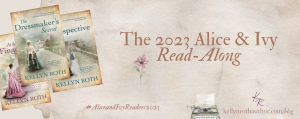
Hello everyone!
Simply put, let’s do a read-along.
(Or re-read-along, as the case may be! Both situations are welcome.)
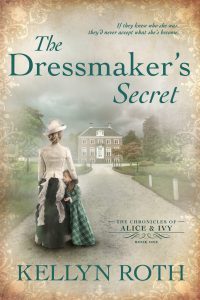 ABOUT THE READ-ALONG
ABOUT THE READ-ALONGI’m host a fun read-along running from March to September of 2023. We’ll read the first five books and Becoming Miss Knight (novella) in preparation for Like a Ship on the Sea releasing in September!
It’ll be simple, low-pressure, and you can choose your level of participation.
WHY SHOULD YOU DO IT?
Here’s the best part: there will be prizes, and they are NOT all dependent on finishing a certain number of books, et cetera. Yes, this is one of those things that essentially gives participation trophies.
However, there are some things that I will only be sending out to people that finish certain books & review them, because after all, this is kind of a big endeavor for me!
THE PRIZES
All people who follow me and wish to seek these things out will find publicly available:
Monthly lives on Instagram, Facebook, and YouTube
 All people who agree to participate in the challenge (regardless of whether they actually finish any books) will receive:
All people who agree to participate in the challenge (regardless of whether they actually finish any books) will receive:
A few of the giveaways currently planned include: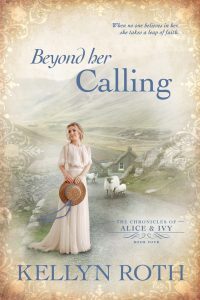
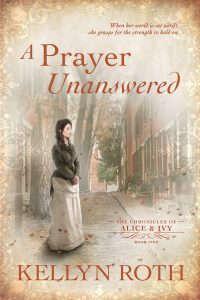 However, I intend to post more giveaways and other special treats as time goes on. I just don’t want to plan that far ahead.
However, I intend to post more giveaways and other special treats as time goes on. I just don’t want to plan that far ahead.
HOW TO SIGN UP:
That’s easy! Just fill out the form below:
Frequently Asked Questions & Answers:(which are frequently asked because I anticipate them, not because anyone has actually asked them)
IS THIS JUST FOR PEOPLE WHO HAVEN’T READ THE BOOKS YET?
No! Definitely not. Re-readers are more than welcome, and their reading will be counted the same as people reading it for the first time.
WHAT IF I DON’T OWN THE BOOKS?
I can provide you with a free ebook copy or … (see below about audiobooks).
DO I HAVE TO ATTEND ALL THE “EVENTS” TO WIN THE PRIZES?
NO! These are all entirely optional. You may decide to watch them/participate them at your discretion. The only thing that you have to do to win is READ (or listen—see below!) and in some cases, review.
DO AUDIOBOOKS COUNT?
Yes! In fact, if you want an audiobook copy of any of the above books, with the exception of Becoming Miss Knight, I can provide a code for a free Audible copy while they last.
WHAT IF I DON’T WANT TO JOIN THE SLACK GROUP?
I will send out monthly emails to anyone who wants to do the read-along without participating in the Slack group. However, I will tell you that you’ll be missing out!
WHAT IS THE SCHEDULE?
Roughly speaking:
March — The Dressmaker’s Secret
April — Ivy Introspective
May — Becoming Miss Knight
June — At Her Fingertips
July — Beyond Her Calling
August — A Prayer Unanswered
WHERE DO I DIRECT ANY QUESTIONS?
You can comment them below, email them to me ([email protected]), or direct them to the group once it is created.
HOW DO I SIGN UP?
Fill out this form any time before September!
TTFN!
~Kell~
P.S.What do you think? Does this sound like fun? Are you going to participate? Let me know in the comments!

Are you interested in getting to know me & my books better?
I want to invite you to my super secret club. I mean, it’s not really a secret, because I’m telling you about it now, but here goes.
Join Mrs. Roth’s Society Column, my street team! We’d love to have you along for the ride!
February 22, 2023
The Heart Behind Second-Chance Romance {Romance Trop Blog Collaboration}
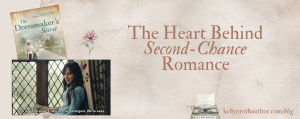
Hello my friends! Today I’m joining a blog collaboration with Grace A. Johnson and R.M. Archer. Our goal is to share about certain romance tropes. You can read Grace’s post on enemies-to-lovers here and R.M.’s post on arranged marriages.
But now I get to say my piece, and I’m talking about something I don’t believe I’ve ever talked about on my blog before: the heart behind second-chance romance.
Let’s talk about it.

Much like how Pride & Prejudice seems to have inspired enemies-to-lovers (see my post about that here), Jane Austen’s Persuasion seems to be the origin of second-chance romance. It’s a trope that may go further back, as with P&P. In fact, there’s some scholarly debating over whether Much Ado About Nothing is a second-chance romance (which definitely makes my favorite Shakespeare play all the more interesting).
Regardless of where this trope originated and how long it’s been around, it’s no secret that there are dozens of romances—many of them with “second-chance” slipped into the title—available on booksellers everywhere. Specifically, this seems to be a common trope in the subgenres of bully romance (gross), secret baby romances (has to be handled very carefully), and older adult romances (which is cute & we need more of because romance doesn’t disappear at 25).
There are two books that can be loosely categorized as “second-chance romance.”
Persuasion-style, in which a character reunites with an old sweetheart and has a “second chance” at love with them.Books that have ANY “second” romance—so if the main character or characters experienced heartbreak in the past, some people will define it as “second chance.”In this post, we’re specifically focusing on Persuasion-style second-chance romance where the main characters are reuniting after a separation, but we will also cover the more “finding love again” variation of this which is such a common trope that it’s become less of a trope and more of a romance staple for any slightly-older characters.
Perhaps this has become less of a trope and more of a romance staple in some areas. A lot of the stories I was able to come up with that contained some portion of this trope but not all of it. Oftentimes hints of this trope at contained within a larger overarching story rather than being the entire plot.

Persuasion
Persuasion is the first book that comes to mind, and at first, it was the only QUALITY book that came to mind. However, notwithstanding, it is the Queen of this trope. No one has done this trope with the same seriousness, emotions, and functionality as Austen did way back in the early 1800s. Anne Elliot’s story is heart-wrenching, and we are able to see her both as a flawed person and as someone who desperately needs the love she missed out on. Further, on the reread, you see exactly what our dear captain was thinking and want all the more for them to end up together. Though this is far from my favorite Austen novel, I still appreciate the tropes as presented, and goodness, they are well done.
 The Dressmaker’s Secret
The Dressmaker’s Secret
My own book!
Granted, I don’t hit a lot of the tropes, but at its essence, for a non-romance book, that is essentially what the story is.
The reason I think this story doesn’t really feel like a second-chance romance (other than Alice being a narrator along with Claire) is that the focus was never, “Will they find love again?” It was, “Will they create a FAMILY?”
And to me, that’s more powerful. It’s not just giving in to uncontrollable emotions. I couldn’t care less about that (even though I may squeal a little when it happens in a favorite book or movie). It’s about choosing commitment, choosing what’s right, choosing each other. And I’ll talk about that more later, but isn’t that what second-chance romance ought to be?
A few other books in my genre that contain this trope include:
In Love’s Time and High as the Heavens by Kate BreslinShadows of Swanford Abbey by Julie KlassenThe Heart’s Charge by Karen WitemeyerFrom films, I’ll point you to:Downton Abbey (BBC drama series)
This is basically Mary and Matthew’s end-game story, and I love it. As you know if you’ve watched the show, their relationship is complicated but beautiful. It slowly draws you into the realization that they can ONLY be together, but some bad advice and both of their pride separates them when they were practically engaged (*squeals in protest*), and it continues to separate them until at last … at last!
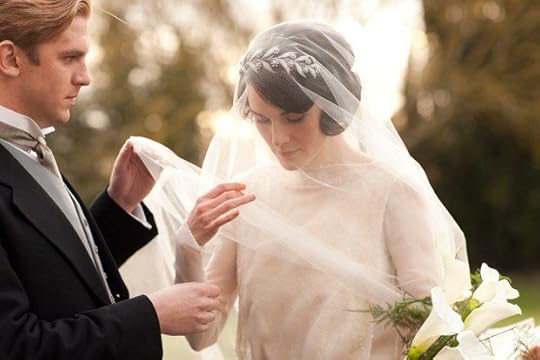 This feels like it should be too frustrating to work, but it is so well done, and further, you really believe this couple belongs together. They are simply separated by their character flaws, by society, and by a lot of bad luck. At first, Matthew is Morally Superior—Mary is closed off to her own emotions and takes bad advice with a desire to conform to societal norms. Later on, various factors keep them apart, including other love interests, war, injuries and illness, and then again, their own pride.
This feels like it should be too frustrating to work, but it is so well done, and further, you really believe this couple belongs together. They are simply separated by their character flaws, by society, and by a lot of bad luck. At first, Matthew is Morally Superior—Mary is closed off to her own emotions and takes bad advice with a desire to conform to societal norms. Later on, various factors keep them apart, including other love interests, war, injuries and illness, and then again, their own pride.
Matthew’s Moral Superiority keeps on popping up, and I find it interesting that the first time he’s really like, “You know what, I love you anyway” is in response to Mary confessing she’s not so Morally Superior herself. You see that moment of struggle when she confesses a truth she had been hiding from him, including him asking for clarification (“Did you love him?”), but then even when she admits that there was no Moral Superiority whatsoever in her actions (“It was lust, Matthew!”), he says, “I never could despise you.” (Also, a moment of appreciation for Matthew’s face when Mary says, “It was LUST!!!” because he was totally like, “But we’re English?”) It’s just very well-done thematically—and makes me really happy inside.
The Awful Truth (1937)
 This one is pretty hilarious. Essentially, a couple decides to divorce after a number of shenanigans on both of their parts. Unfortunately, both of them realize that the awful truth is … they are still in love, despite their difficulties. However, they are both too prideful to admit it. More shenanigans ensue but fortunately, they end up together in the end.
This one is pretty hilarious. Essentially, a couple decides to divorce after a number of shenanigans on both of their parts. Unfortunately, both of them realize that the awful truth is … they are still in love, despite their difficulties. However, they are both too prideful to admit it. More shenanigans ensue but fortunately, they end up together in the end.
This one doesn’t really work UNLESS it’s a comedy. Because it’s a comedy, however, you really want these “awful” (pun intended) people to end up together because clearly they both need to be awful TOGETHER and grow up some.
I Love You Again (1940)
Same principle as The Awful Truth, but in this one, the guy gets amnesia and forgets his entire marriage—including the fact that he became an awful bore before he wooed his wife, who is now leaving him. Now, feeling like his younger (and arguably more interesting) self, who was a con man, he tries to scam her out of his own money before he leaves forever … but ends up falling in love and winning her back.
It’s cute because HE’S falling in love with her for the first time and SHE’S falling in love with this apparently more romantic side of him that’s coming out JUST FOR HER, and it’s … adorable. Goofy, but adorable.
Honestly, what I’m gathering from these is that second-chance romance works better in romance, which is a missing point in most of the novels I’ve seen for sale. Y’all pay attention, okay?
The Philadelphia Story (1940) and High Society (1956)
These two are some of my favorite old movies which are pretty much the same only the second is a musical. The heroine is inherently unlikable, but that’s some of the fun of it. Despite the fact that in both versions, she’s subject to some period-era sexism, you know that the guy who really wants her with treat her well in the end. And she needs to get back with him and give up her pride to do so. Further, these are just fun movies (or I think so—I’ve heard the opposite, too).


It’s time to break down the emotional logistics.
As with any trope, there are a lot of silly or shallow books written. This trope is often misused and seems to have less variety in it than others of their ilk. That said, we’re not talking about the dozens of silly, petty second-chance romances on the market. We’re talking about writing this trope, which is really just a type of relationship, in a realistic, heart-rending, and interesting way.
Here are a few of that
Let’s start with the negative ones.
Negative Desires in Second-Chance Romance ReadersWe want to be pined after—and sometimes we enjoy pining.
Oftentimes second-chance romances feature one or both of the main characters pining after the other. We all relate to that, somehow. Our hearts squeeze at the thought of having our hearts broken—we don’t want it to happen to us. We don’t want it to happen to our characters either.
And we want to believe that maybe, just maybe, we are still loved even after whatever it was that drove us apart from our loved one.
Really, this is not a truly romantic thing. True romance involves love, and it is not loving to hold onto someone long after they’re gone. True love sometimes involves letting go and moving on.
We want what we wait for more than what we have.
This is why so many TV shows pull a lot of their plotlines from those “will they, won’t they” plotlines. We are looking for those secret glances. And though we want the satisfaction of the ending, the grass is always greener—so once the plot thread concludes, so does the story.
Though TV show producers want to drag that on as much as possible, authors often don’t, and readers love getting a taste of those feelings without having to go through seven trashy seasons of a TV show they’re only into for one will-they-won’t-they couple.
We have an inherent desire to return to what was.
All romance does have a degree of wishful thinking, and second-chance romance is a leader in said wishful thinking. As with the other two, readers and watchers of this trope sometimes look back at their own failed romances and nostalgically wonder what might have been. (Though I’m married to a man I wouldn’t give up for anything, sometimes I do wonder about past flirtations, of which I had a few. What would THAT life have been like? It’s a question no human can fail to ask.)
Though a lot of this can be said to feed humanity’s negative desires (after all, at the end of the day, it is more fulfilling to NOT have years of heartache, despite how it tends to be romanticized by this trope and others), we can pull great beauty out of this trope, too, if we use our healthy minds to draw healthy conclusions.
Let’s talk about the positive.
Positive Desires in Second-Chance RomanceWe know that realistic romance MUST include forgiveness.
Human beings sin. We mess up. We do and say and think stupid things. And because romance is a relationship, not a genre (see what I did there, Grace?), we know that romances must include mistakes—and forgiveness of said mistakes once the inevitable apology comes around.
A lot of second-chance romances feature a forgiveness plot, and honestly, I like them. There’s a great need for forgiveness in my life and relationships—and it is precious to see the accurately and gracefully reflected in fiction.
We desire for all relationships to be resolved.
“If it is possible, as much as depends upon you, live peaceably with all men.”
God didn’t just write that in the Bible for kicks and giggles. Though sometimes it is important to move on, to break away from what is unhealthy or perverted, sometimes it is better to STAY.
In a world where divorce is rampant and a large percentage of engagements are broken off before the couple even gets to say “I do,” some romance author somewhere said, “This couple comes back together, despite it all—and they stay.” And that is powerful.
Stay in the marriage. Stay in the relationship. Stay because of love—stay in spite of a lack of love. And allow God’s grace to carry you through.
Now, I don’t want to romanticize staying in abusive, unhealthy relationships. However, do I want to romanticize staying (or coming back to) relationships with broken people who are trying their utmost to follow Christ? Yes. Absolutely. Because just staying is romantic sometimes.
To quote Taylor Swift, because why shouldn’t I do whatever I want, “Don’t read the last page, but I stay …” (That line always breaks my heart a little in a good way.)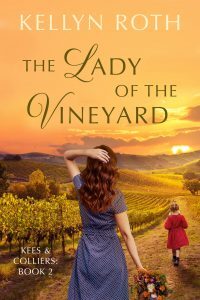
We want to be given that second chance.
“Forgive, and you will be forgiven.”
Jesus Christ gave us that second chance—and we know we didn’t deserve it, but He did. How much more should we then reflect this in our own stories?
“But if you do not forgive others their trespasses, neither will your Father forgive your trespasses.”
Honestly, we don’t deserve second chances, but we’re always offered them—and as we know, Christ values our dedication to forgiving those that hurt us.
“If we confess our sins, He is faithful and just to forgive us our sins and to cleanse us from all unrighteousness.”

Second-chance romance is a trope that gets a little less attention than others. As you can see, it’s not inherently toxic, but it can get a little old. It requires some creativity to make this work, and in the romance genre, you are almost rewarded by readers for not seeking creativity.
That said, I challenge you to give this trope a “second” look! It has worth—it just has to be done in a specific way. Further, it has so much potential to dig into themes that we don’t often explore in romance. I wish, for instance, that people would write second-chance romances where characters get together after a long separation DESPITE not loving each other—because they know it’s the right thing to do. (Spoilers, but see The Lady of the Vineyard, for instance.)

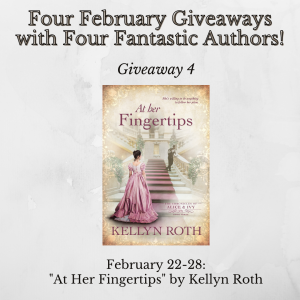 Before You Go:
Before You Go:I have a giveaway running! I’m giving away a paperback copy of At Her Fingertips this month to celebrate Valentine’s Day.
You can enter the giveaway here:
ENTER THE GIVEAWAYHonestly, though this book ISN’T exactly a second-chance romance, it has elements of the secondary variation of the trope (finding love after losing love), and overall, it feels like a second-chance romance somehow. Maybe it’s just my main couple’s vibe (in book 5, too).
Anyways, enter soon, because it’s only running a week!
TTFN!
~Kell~
P.S.Are you a fan of this trope? Why or why not? (I know a lot of people who aren’t, so you won’t surprise me!) Do you see potential in this trope?

Are you interested in getting to know me & my books better?
I want to invite you to my super secret club. I mean, it’s not really a secret, because I’m telling you about it now, but here goes.
Join Mrs. Roth’s Society Column, my street team! We’d love to have you along for the ride!
February 15, 2023
Two Valentines Day Anthologies: Tell Me You Love Me and Seize the Love

Today I have two indie anthologies to share with you today!
The Tell Me You Love Me Anthology and the Seize the Love Anthology will both released on Valentine’s Day, February 14. Be sure to check ’em out if you like to read about ~love.~
Tell Me You Love MeTell Me You Love Me – a timeless collection of stories that truly understand the meaning of “I love you”
Twelve young Christian authors have come together, alongside romance novelist Grace A. Johnson and editor Issabelle Perry to show our world of depravity and cheap imitations of romance what love really means: faith, hope, and sacrifice.
These stories range from contemporary YA to historical to fantasy, and tell diverse, unique love stories that compel, captivate, and warm readers’ hearts with their sweet and authentic nature.
Featuring work from Michaela Bush, Saraina Whitney, Karynn Heckler, Margaret Copeland, Lucia Molano, Sarah Lawton, Brooklyn O’Brennan, Mackenzie Hendricks, H.S. Kylian, Lydia M. Jupp, Katherine Perry, and Amelia Cabot, the Tell Me You Love Me anthology is the collaboration of talented and inspirational young writers you’ve been waiting for!
Learn more at graceajohnson.com/tell-me-you-love-me-anthology or on Goodreads !
 Seize the Love
Seize the LoveHonoring the Love of the Savior
Agape. Eros. Philia. Storge
All forms of love… Seize the Love pulls readers into an anthology of stories all showing love. A love that honors God even as the reader flips the pages to find the story of a dying request, a random encounter, finding proof of God’s love, reunited siblings, caring for others, finding hope, love among the hard and easy, and more stories.
No matter the form of love, you’ll find stories sure to warm your heart, bring a smile or a tear, and hopefully remind you of the love of the One who created you.
Matthew 22:37
Jesus said unto him, Thou shalt love the Lord thy God with all thy heart, and with all thy soul, and with all thy mind.
Featuring various love stories sure to please the whole family.
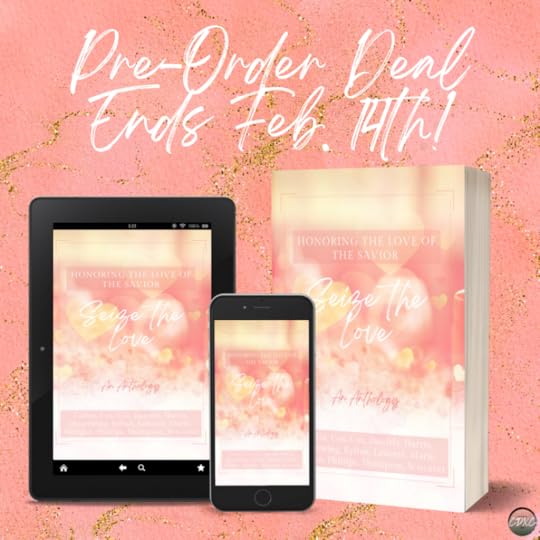 Links
LinksYou can find the Tell Me You Love Me Anthology here on Goodreads and buy it here on Amazon. And you can find the Seize the Love Anthology here on Goodreads and buy it here.
ScheduleFebruary 7th
Grace A. Johnson – tour kickoff
H.S. Kylian – anthologies spotlight & giveaway
Kaytlin Phillips – anthologies spotlight & giveaway
February 8th
Grace A. Johnson – anthologies spotlight & giveaway
February 9th
Rhys-Marie Whitnell – anthologies spotlight & STL review
February 10th
Vanessa Hall – STL spotlight & anthologies giveaway
Weekend Break
February 13th
Lilly Wiscaver – STL spotlight & giveaway
Allyson Jamison – STL spotlight
February 14th – Release Day!
Madisyn Carlin – STL spotlight & giveaway
Lillian Keith – anthologies spotlight & giveaway
February 15th
Kellyn Roth – anthologies spotlight
February 16th
February 17th
Kristina Hall – anthologies giveaway
Vanessa Hall – TMYLM review
Weekend Break
February 20th
Allyson Jamison – TMYLM spotlight
February 21st
Merie Shen – TMYLM review & anthologies giveaway
Katja Labonte – anthologies spotlight
Katja Labonte – anthologies review
Abigail Kay Harris – tour conclusion
TTFN!
~Kell~
P.S.Have you read either of these anthologies? What did you think?

Are you interested in getting to know me & my books better?
I want to invite you to my super secret club. I mean, it’s not really a secret, because I’m telling you about it now, but here goes.
Join Mrs. Roth’s Society Column, my street team! We’d love to have you along for the ride!
February 8, 2023
Chapter length, story length, and more: the ultimate guide to how long you should be writing

This is a question I’ve heard repeated over and over again in every writing forum I’ve ever visited. Writers just want to know how long their chapters and their books in general should be.
The problem is, there’s not a solid answer. “How many words!?” Most the time I find myself saying, “However many you want.”
That said, there are some guidelines, though they’re very flexible, especially for the indie author (who is free to do just about whatever they want).
Still, today we’ll be talking about industry standards for length (by the word) within the traditional publishing world as well as in general!
We don’t want to consider how many pages here. If you want to talk pages, well, I want to talk page sizes first—and then fonts and font sizes and indents and … you get the idea. We’re focusing on words in this post.
Chapter LengthIn general, chapter length is actually very flexible. There aren’t even available industry guidelines available—at least nothing solid. It really depends on your book.
Most times, it’s not even required to put chapters in! It’s an author choice.
However, I will tell you that most authors I know, including myself, aim for between 1,500-3,000 words per chapter. I personally try to keep them all between 2,000 and 3,000 but lately it’s been like 3,000-5,000 because my characters are not cooperating.
Children’s fiction authors or authors of fast-paced books may shorten their chapters, and with longer books, it makes sense to have longer chapters oftentimes.
Honestly, though, this is a choice you have to make for yourself. What do you feel comfortable with? About how long do you estimate the chapters of the books you read are?
In the end, finding a good stopping place and going with that is better than obsessing over chapter length when you could be working on your next book!
What makes a novella (and a short story and so on)?There is again some flexibility, but here are some general guidelines.
Flash fiction: 1-1,000 words
Short story: 1,000-8,000 words
Novelette: 8,000-15,000 words
Novella: 15,000-40,000 words
Novel: 40,000+
Note that though 40,000+ technically count as novels, most novels are in the range of 60,000-100,000. Also, the difference between a novella and a novelette is a blurred line; many people will call anything 10,000-40,000 a novella!
By the genre: traditional standardsIn the traditional publishing world, genre-length standards are totally a thing. Here’s some general lengths!
Science fiction and fantasy:
There is some flexibility with any genre, but this is the category that tends on the long side. However, they don’t usually exceed 150,000 words.
90,000-120,000 is a good guideline for science fiction and fantasy. Audiences in this genre generally are more comfortable with epics, wanting to spend more time in the
Romance:
50,000-100,000. I know, I know—that’s a big difference! But this includes a lot of subgenres, after all: contemporary, historical, paranormal, fantasy.
When writing a romance, always think about your subgenres. Historical fans may be all right with slightly longer novels than contemporary fans—but if you’re writing less “epic” historical romance, you may want to go on the shorter side.
Historical fiction:
Anywhere from 80,000-100,000 is acceptable for this genre, though it can be a little bit more. After all, you’re doing the same thing with that science fiction and fantasy authors are doing—you’re creating a new universe for your contemporary readers!
Note that some subgenres can be shorter. Christian fiction and romance (and combinations of the two) tend to be on the shorter side.
Crime/Mysteries/Thrillers/Horror:
These are all page-turners, and they require a fast pace, so they tend to be slightly shorter, generally in the range of 70,000-90,000 words.
Some subgenres, however, can be shorter—it’s not uncommon for cozy mystery, for instance, to be more in the range of 50,000-60,000, for instance.
Young Adult (YA) fiction:
YA has some variance, especially due to subgenres, but it’s a little shorter than most adult fiction—usually 50,000-80,000 words. A fantasy YA title would be a bit longer, but
Children’s fiction:
Like YA, there’s a lot of variance to be had here. Children’s picture books can vary a lot! Just grab a couple off your shelf (assuming you have picture books!), and you’ll see a lot of variance depending on the specific age they’re targeting.
Chapter books for children vary, too. For ages 8-10, they’re in the range of 1,000 to 10,000 words, though it’s feasible for it to be a bit longer. For ages 8-12, this will go up to 10,000-30,000. If you’re aiming for 10-14, then 25,000+ is common and can be as long as 50,000. The Lion, the Witch, and the Wardrobe by C.S. Lewis measures 38,421 words.
As I said before, these are more guidelines than rules.If you’re pursuing traditional publishing, you’ll want to follow these guidelines somewhat closely, or at least take a stroll through the general ballpark.
However, indie authors can make or break these rules. Just keep in mind that if you write a 100,000 word long children’s fiction novel, you won’t have a lot of kids getting through it!
I’d say common sense and reader reactions are the biggest guidelines for an indie author.
For instance, if most of your readers are mentioning that they’d hoped the book would be a bit longer—not as in they wanted the story to go on but as in it felt rushed or like they hadn’t gotten their money’s worth— that might be a sign you need to write longer.
But … if a lot of readers are quitting halfway through or complaining about it seeming to drag, that could be a sign that you’re writing on the long side!
TTFN!
~Kell~
P.S.How long do your stories tend to be?

Are you interested in getting to know me & my books better?
I want to invite you to my super secret club. I mean, it’s not really a secret, because I’m telling you about it now, but here goes.
Join Mrs. Roth’s Society Column, my street team! We’d love to have you along for the ride!
Kellyn Roth, Author
Find the main blog at http://kellynrothauthor.com/blog ...more
- Kellyn Roth's profile
- 1122 followers



